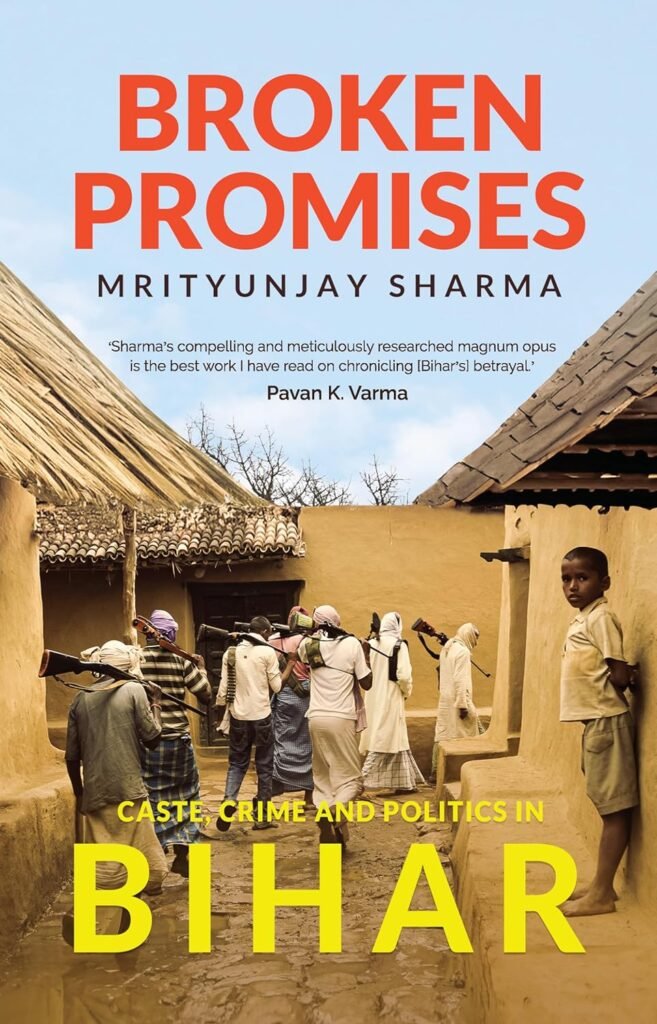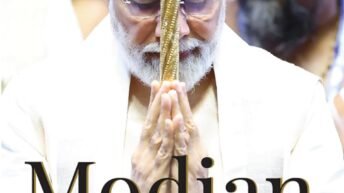|
Listen to article
Getting your Trinity Audio player ready...
|

“Broken Promises: Caste, Crime and Politics in Bihar” by Mrityunjay Sharma stands as a riveting and intellectually stimulating narrative, unravelling the intricate entanglement of caste, crime, and politics entrenched within the fabric of Bihar, an emblem of India’s enduring struggle with poverty and governance. Drawing from his diverse background as both an academician and entrepreneur, Sharma presents a compelling analysis, delving into the labyrinthine corridors of Bihar’s historical legacy and contemporary realities. With meticulous attention to detail and an unwavering commitment to uncovering the truth, Sharma navigates through the annals of Bihar’s political evolution, shedding light on the multifaceted forces that have moulded its tumultuous landscape. Through rigorous research and penetrating insight, he peels back the layers of secrecy and deceit, laying bare the festering wounds of corruption, violence, and exploitation that have festered beneath the veneer of governance.
In this illuminating exposition, Sharma confronts the harsh realities of Bihar’s socio-political milieu, exposing the systemic failures and broken promises that have perpetuated its cycle of despair. With a blend of scholarly rigour and narrative flair, he confronts the reader with uncomfortable truths, challenging conventional wisdom and prompting a revaluation of entrenched beliefs.
“Broken Promises” emerges not only as a scholarly treatise but also as a clarion call for introspection and reform. Through its pages, Sharma beckons readers to confront the stark realities of Bihar’s plight, urging them to confront the moral imperative of change. It is a testament to the power of knowledge and inquiry, a beacon of hope amidst the shadows of cynicism and despair.
The book is divided into Seven parts, each delving into a specific aspect of Bihar’s politics. Sharma begins by tracing the rise of Lalu Prasad Yadav’s Political Career to the history of caste politics in Bihar. He then moves on to examine the rise of criminal politicians, who have infiltrated the state’s political machinery and perpetuated a culture of violence and intimidation in addition to caste Wars, Unique crimes, and the Entry of Nitish Kumar in the Governance of Bihar. One of the book’s greatest strengths is its ability to humanise the victims of Bihar’s broken system. Sharma’s vivid descriptions of the repercussions faced by Upper Caste, Dalits, Muslims, and other communities due to violence and massacre are both heartbreaking and infuriating. Through the stories of Massacres in Dalelchak-Bhagaura (Aurangabad), Barra (Gaya), Bathani Tola (Bhojpur), Sharma brings to life the human cost of Bihar’s failed promises.
The book delves into the enduring legacy of caste-based divisions and their profound influence on the state’s socio-political fabric. Sharma skilfully weaves together caste narratives, statistical data, and detailed case studies to illustrate how caste allegiances have both enabled and hindered the pursuit of justice, development, and good governance in Bihar. He described how the Kidnapping Industry was a low-risk, high-return venture in the absence of any notable arrests or convictions. A result of the relationship between politicians and criminals, and the lack of political resolve to address the threat along with Police incompetence. A total of 32,085 occurrences of kidnapping were reported between 1992 and 2004 in Bihar.
The book is not without its criticisms of the Bihar political establishment. Sharma pulls no punches in his condemnation of the politicians who have enabled and profited from Bihar’s criminal-political nexus. By highlighting the complicity of politicians in Bihar’s downfall, Sharma underscores the need for systemic change. Throughout the book, Sharma’s writing is engaging and accessible, making “Broken Promises” an essential read for anyone interested in Bihar politics, sociology, or human rights. While the subject matter is often disturbing, Sharma’s prose is clear-eyed and unsentimental, making the book a page-turner.
In his book, Sharma delved into the intricate dynamics of caste-based violence within Bihar, emphasising a notable geographical pattern. Contrary to a widespread assumption, such violence was not pervasive across the entire state but rather emerged and persisted primarily in specific regions, notably the central belt along the Son River. The genesis of the Naxalite movement, a significant socio-political upheaval in Bihar, originated in Bhojpur. This movement then rippled outwards, affecting adjacent districts including Gaya, Jehanabad, Aurangabad, Patna, Nawada, and Rohtas. These areas became focal points for caste conflicts that ensued in the wake of the Naxalite movement’s emergence. What’s intriguing is that this central region of Bihar, where the violence was concentrated, exhibited a paradox. Despite being comparatively wealthier than the northern and southern regions of Bihar, it became a hotbed for caste-based tensions and Naxalism. This challenges the simplistic narrative that attributes the rise of Naxalism solely to abject poverty, suggesting that other socio-political factors were at play in catalysing these conflicts.
The author meticulously documents the rise of “Bahubali” (strongmen) figures, who have leveraged their connections and muscle power to gain and maintain a stranglehold on the state’s political and economic institutions. The book’s analysis of the systemic failures that have allowed such figures to thrive is both eye-opening and deeply troubling. Sharma’s narrative also delves into the complex dynamics of social and economic inequality, highlighting how the entrenched caste hierarchies have perpetuated cycles of marginalisation and limited the opportunities available to large segments of Bihar’s population. The book’s exploration of the state’s struggles with issues such as education, healthcare, and infrastructure development provide a sobering assessment of the broken promises made to the people of Bihar.
In conclusion, “Broken Promises: Caste, Crime and Politics in Bihar” is a searing indictment of the failures of Bihar’s political system. Mrityunjay Sharma’s meticulous research has produced a book that is both a powerful exposé. “Broken Promises” is a must-read for anyone seeking to understand the intricate web of challenges facing the state of Bihar. Sharma’s work not only illuminates the past and present realities but also serves as a clarion call for reform and accountability. The book’s engaging and accessible style makes it a valuable resource for scholars, policymakers, and concerned citizens alike, as they grapple with the task of transforming Bihar’s future.






Add comment